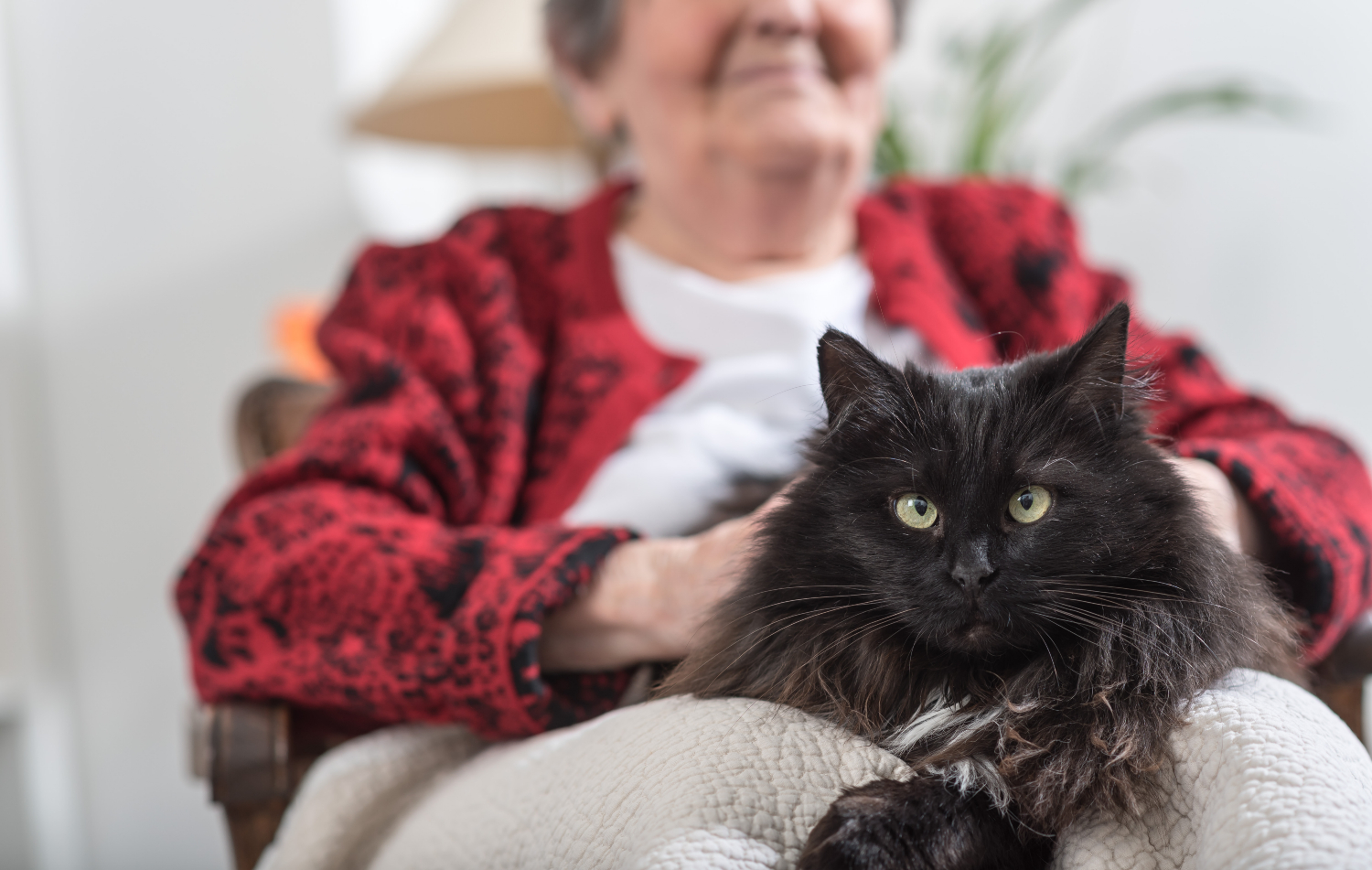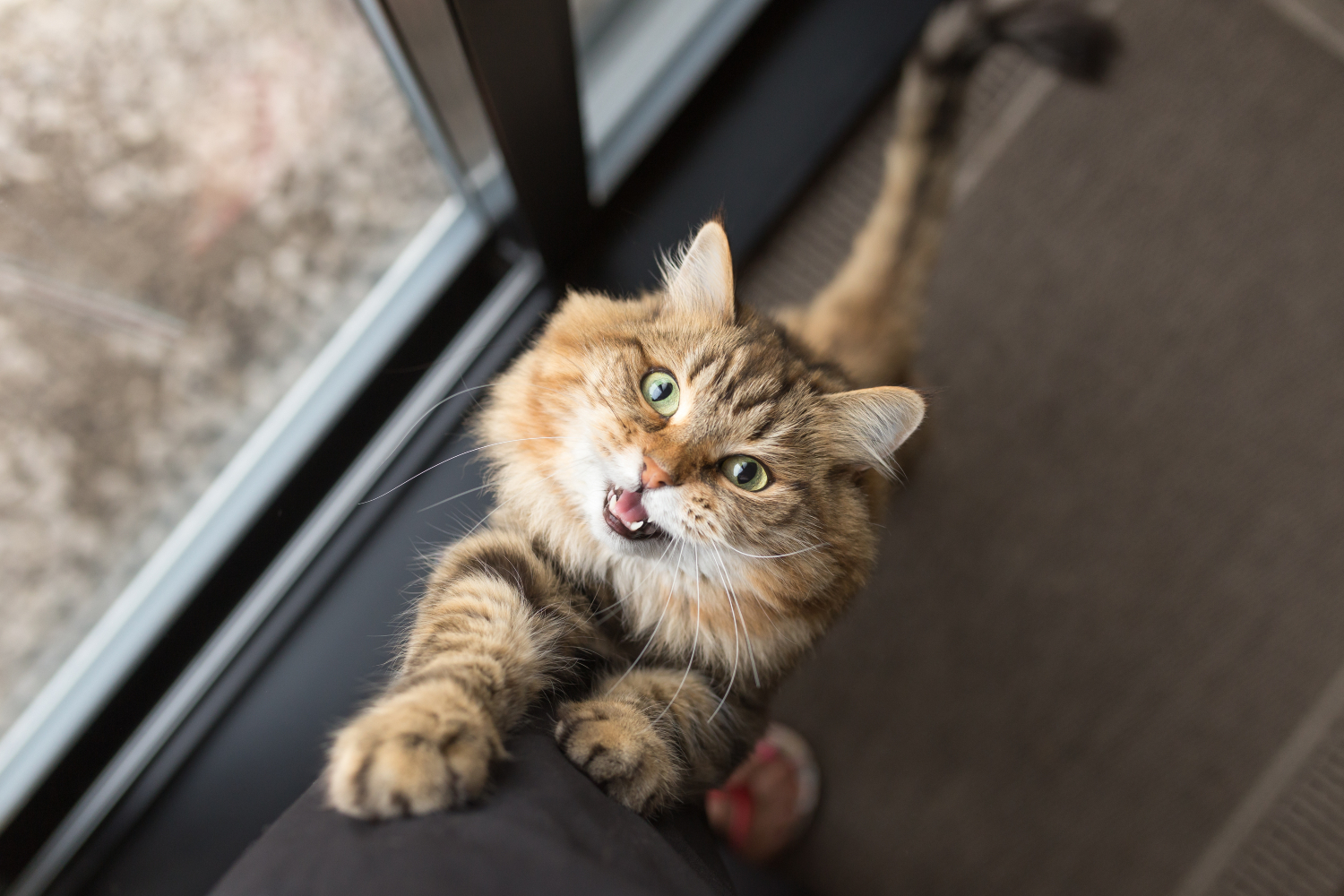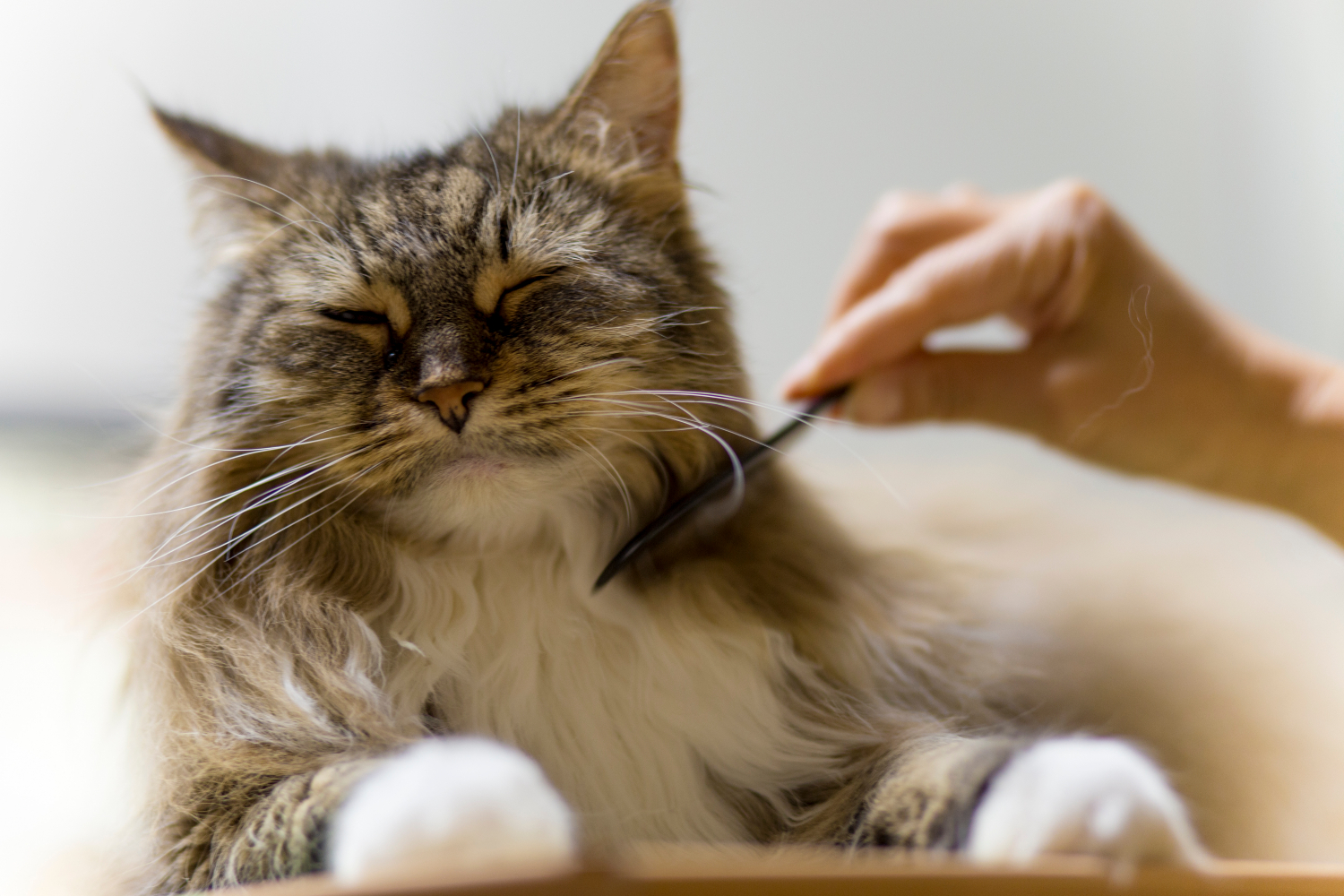
Recognising behaviours and changes in an ageing cat
24th January, 2023
Is your moggy not as playful as it used to be? Have they gone off their food? Petwise shares which behaviours are normal in ageing felines and how to protect them through their senior years with pet insurance for older cats.
Just like us, older cats start to slow down. They have less energy and their health can start to suffer.
These are all a normal part of ageing in felines, but some experience behavioural changes, too. A cat who was once your best snuggle buddy in the evenings might now prefer to be alone or even become aggressive when you try to touch them.
But how can you tell if they’re just acting their age or it’s time to take them to the vet?
Discover the many ways your cat might change with time and how you can help them feel comfortable through their golden years.
We also share how to know when your cat is suffering and when it’s time to take them to the vet. Pet insurance for older cats from Petwise has no upper age limit, so senior moggies can get emergency care when they need it most.
When does a cat become ‘old’?
Cats are sprightly animals, and can stay very agile for many years after they become a senior, but when are they actually considered old?
As they age, felines are more likely to suffer from health concerns, which is why pet insurance for older cats is so important.
Numerous visits to the vet and lots of treatment can mean the medical bills mount up. With lifetime coverage, the financial pressure will be alleviated allowing you to seek care for your faithful feline when they need it most.
Behavioural changes to watch for in an ageing cat
You’re prepared for your senior cat to change as they age, but what should you expect?
- Confusion and disorientation
- Forgetting or refusing to use the litter box
- Sleeping more or less
- Reduced energy and playing less
- Not responding to their name
- Different eating patterns
- Aggression
Below we discuss these common behavioural changes in more detail and share what’s normal and when to seek medical advice.
Confused and disorientated
Elderly cats often suffer from cognitive dysfunction, which many people call ‘cat dementia’ and believe is similar to dementia and Alzheimer’s in humans.
As a result, your once-loving feline might become more vocal, seem disoriented, and even appear to have a complete personality change.
It can be challenging seeing your beloved pet like this, but they need all the love and support you can give at this time. You’ll need patience and to make sure they feel safe and secure into old age.
Unfortunately, there’s no treatment for cognitive dysfunction, but you can speak with your vet to see if there’s any way you can help them with specific behavioural changes.
If you have pet insurance for older cats with Petwise, you can use the 24-hour vet video consultation service for quick and professional advice regarding your senior moggy’s behaviour.
Forgetting litter box training
One of the most obvious signs your ageing feline has cognitive dysfunction is urinating in places other than their litter box. It’s common for cats to forget all the years of training or not remember where the toilet is.
There's not a lot you can do about this except put the litter box somewhere your pet can find it easily. If you notice there’s a certain spot they use for the toilet, you could move it there. Or keep a few litter boxes around the house.
Going to the toilet in inappropriate places can also signal other health concerns, like:
- Constipation
- Urinary tract infections (UTI)
- Loss of eyesight
When you notice your cat having toilet troubles like this, take them to the vet to get the right diagnosis.
Different sleeping patterns
Do you like to lie-in more than you used to? Or perhaps you get up at the crack of dawn now you’re older? Similarly to humans, a cat's sleeping habits can change over the years.
Your senior feline might be snoozing more because they have less energy. Let them doze when they want and make sure there are plenty of peaceful parts of the house they can relax in.
While some seem to sleep around the clock, others appear restless and often get up at night. This is usually nothing to worry about and might be because they nap more in the day.
Check with your vet to be sure or use the vet video service from Petwise if you have pet insurance for older cats with us.
Less playful and more tired
It’s not unusual for your playful kitty to become much more docile and less energetic during its golden years.
Your cat used to have bundles of energy, but this wanes as they get older. Your pet may also become bored with old toys and no longer feel the need to explore its surroundings through play.
This can be disconcerting to owners, but as long as the change isn’t sudden or too dramatic, it’s simply another sign of old age.
Not responding to their name or other loud noises
If you notice this behavioural change in your senior cat, it’s time to take them to the vet. When a feline no longer responds to noises, especially their name, they might be suffering from hearing loss.
It’s common for pet parents to not realise their cat is deaf because felines still use their other senses well despite not hearing properly.
Other symptoms of hearing loss include:
- Meowing louder than normal
- Sleeping more
- Not waking at loud noises
- Not realising when you get home
- More sensitive to smells and touch
It might be permanent hearing loss, but it could also be something treatable like an infection. That’s where your pet insurance for older cats can come in to help cover the costs.
A change in eating habits
It’s no secret cats are fussier than dogs when it comes to food, but if they go off their favourite dish, it could be due to an age-related condition.
A lack of appetite could be a result of reduced activity levels, but it can also signal something’s wrong with your faithful feline, such as:
- Diabetes
- Hyperthyroidism
- Infections
- Oral/Dental disease
- Kidney failure
- Cancer
Get your cat to the vet to see if there’s an underlying cause for their reduced appetite and to find out how much food they need now their older.
Pet insurance for older cats with Petwise comes with dental cover as standard in case an oral issue is to blame for their disinterest in food.
Signs of aggression
One of the most difficult behavioural changes to witness in your ageing moggy is aggression, particularly if they used to be very affectionate.
It might be because they’re less patient and less fond of change than they once were, but it can also signal an underlying age-related issue or that they’re ill or in pain.
If you suspect something’s wrong with your elderly cat, get them seen by the vet as soon as possible. It’s better to spot a medical condition early and have it treated than wait until your pet becomes severely ill and untreatable.
What is normal behaviour for an old cat?

As your furry feline becomes a senior, it’s completely normal for them to:
- Spend more time indoors
- Hunt less
- Sleep for longer
- Be less active
- Become more vocal
While these behavioural changes can be a normal part of ageing, they can also be a symptom of something more serious. Whenever you notice sudden or drastic changes, it’s important to get professional advice. Having pet insurance for older cats means you don’t have to delay.
What health concerns are common in older cats?
As we age, we become more susceptible to certain health issues, and it’s just the same for our feline friends. You’ll need to watch out for any unusual changes in your pet and call the vet if you suspect something’s wrong.
Some of the more common problems your old cat might suffer from include:
- Arthritis
- Diabetes mellitus
- Kidney and heart disease
- Dental disease
- Hyperthyroidism
- Cancer
When caught early, many of these conditions can be managed with the right treatment.
Non-emergency check-ups like a routine annual health vet check-ups aren’t included in pet insurance for older cats but are an essential part of being a good pet parent. Although it must be mentioned that some consultations for accidents and illnesses that are not deemed as an emergency can still be claimed for on your insurance.
Regular health checks look for certain issues and aim to identify any conditions before they become untreatable or terminal.
You can expect the vet to check your pet for:
- Balance problems
- Lethargy
- Lumps and bumps
- Weight loss
- Stiffness or lameness
- Disorientation
- Aggression
They will also ask you if you’ve noticed anything different about your pet like with their appetite, toilet habits, and whether they’re drinking more or less than usual. That’s why bonding time is so important so you know what’s normal and what’s not when it comes to your pet.
How do you know if your old cat is suffering?
Cats are excellent at hiding their emotions. While this is great for surviving in the wild, it can make it tough to tell when your beloved pet is in pain and suffering.
This is why it’s important to understand a feline’s behaviour to spot when something is wrong with your cat.
According to Battersea, you should look for the following signs that your pet is hurting and needs to see a vet:
- Sleeping more or less than usual
- Eating and drinking less
- Withdrawal from family interactions
- Hiding away
- More vocal
- Less engaged with surroundings
- Lameness
- Sensitive to touch
- More irritable
- Decreased grooming
- Crouching or hunching
- Lowering head
- Wincing and flattened ears
If you suspect your cat is in pain, they are likely suffering a lot more than they appear to be and could need emergency treatment.
Remember to cover your ageing feline with pet insurance for older cats to make sure you can pay for urgent care when they really need it.
Why is my elderly cat so restless?
If your old moggy has started to become more restless, it could be a normal sign of ageing.
Many felines sleep less as they enter their golden years, and it may appear that they are restless as a result. Your cat might also be sleeping more in the day and becoming more active at night.
If your elderly pet has cognitive dysfunction, they might become restless as they feel unfamiliar with their surroundings. Your feline may begin to wander, socially distance itself, and meow excessively.
Whether you believe these new behavioural patterns are down to age or not, it’s important to rule out any underlying issues and treat them before they become more serious.
What to do if your old cat won’t eat
Is your faithful old feline going off their food in their later years? This could be as a result of a number of issues, like:
- Illness
- Vaccinations
- A recent change to their environment
- Finicky tendencies
Whether your pet is unwell or simply becoming picky with old age, they need your help to stop their weight and health declining any further.
Call your vet, and together you can come up with a suitable diet that suits your feline’s needs and tastes. You may also need to implement a few tactics to encourage them to finish meals, including:
- A change in consistency or type of food.
- Heating their meals.
- Mixing fish oil, eggs, or broth into their food.
- Rotating food brands a few times a year.
- Providing appetite stimulants.
- Syringe feeding a liquid diet if it’s ill.
If you find your moggy polishes off its meals when mixed with canned tuna or liver, you need to be careful and only give small amounts. Too much of these treats can cause deficiencies or excessive vitamin intake.
How should I treat my elderly cat?
You’ve spotted the signs of ageing in your elderly cat, which means it’s time to take extra special care of them. Old cats find it more challenging to groom themselves and need to be checked for health problems more often than when they were young.
Here are a few considerations to keep in mind.
Help with grooming
Cats are famed for their self-cleaning habits, but as they age and limbs become stiff, they might need your help. To aid in your pet’s grooming regime:
- Wipe away discharge from its nose, eyes, and anus with cotton wool and warm water.
- Brush their fur with a fine comb, making sure you’re very gentle.
- Check nails often to spot when they need trimming – old cat’s claws can get caught in carpet and furniture more easily as they can’t retract them as well.
You can perform these grooming tasks at home, but if your pet is especially nervous or you don’t feel comfortable doing so, take them to the vet.
Vet check-ups
Cats need to see the vet more often as they age. Old animals are more susceptible to many health concerns and regular check-ups can help spot medical problems in the early stages.
Your vet will ask if you have noticed any changes in your pet’s behaviour and check for any changes in their physical condition.
Encouraging eating
We’ve already mentioned how it’s normal for older cats to eat less, so they might need some encouragement finishing off a meal. You can try out the methods we talked about above and speak with your vet to come up with an ideal diet for your pet.
Hairballs
When your cat was young, hairballs were likely a rare or unseen sight. As they age, felines produce more as their digestion slows down and more hair builds up in their system from ingestion when grooming.
It’s important to prevent as many hairballs as possible, as a build-up can cause constipation or vomiting.
Your vet might prescribe certain supplements or food that can help with hairballs if they become a frequent problem with your feline.
How to change your home to accommodate an older cat
It’s unlikely you’ll need to make any drastic changes for your senior cat to feel comfortable at home, but a few tweaks can make a big difference to their quality of life.
- Make sure all their needs are easily accessible on one floor (food, water, litter box), especially if they find it hard going up and down stairs.
- Consider making the flooring easier on your cat’s paws. Laminated and tiled floors can be slippery to ageing feet, while claws can get caught on loop pile carpets.
- Make their bed cosier and warmer than before as old pets can feel the cold more. An orthopaedic bed is ideal for those with sore joints and muscles.
- Provide easy access to your cat’s favourite lookout spots, like ramps or shallow steps.
- Have a private area in your house where your pet can head to for some uninterrupted peace. This is especially important during holidays and celebrations when there are more people around than usual.
Is my older cat dying?
Unfortunately, all cat’s lives come to an end, which can be a devastating time for any pet parent. Looking for clues that your feline’s health is getting worse is important for you to help them feel comfortable and loved during the later stages of life.
So, how can you tell it will soon be time to say goodbye?
- They show very little interest in eating and drinking.
- They become weak and lethargic.
- They lose interest in activity.
- They sleep much more.
- Their body temperature drops.
- They appear unkempt and start to smell.
- They seek solitude and spend lots of time by themselves.
It can be very difficult to see your once feisty feline this way, but you can make them feel safe and secure by providing a soft, warm bed for them to relax in. Keep the bedding clean and bring the litter box to them if they find it challenging to get to.
Give them lots of love and affection so they know you are with them and call your vet about end-of-life care.
At Petwise, we understand what a tough time this is for a cat’s family to say goodbye to their beloved moggy.
If you have pet insurance for older cats with us, you can call our bereavement helpline to talk about your feline’s illness or death in confidence. Petwise Senior also include Farewell Cover as standard, which caters for euthanasia, cremation and/or burial.
Protect your senior feline with lifetime pet insurance

Whether your cat has only just reached middle age or is considered a super senior, they deserve to be protected.
Pet insurance means you can get emergency care for your beloved pet when they need it most, without having to worry about a huge bill for vet services at the end.
When you choose Petwise, you get dental cover as standard and have access to the 24/7 vet video consultation service.
You can choose from a range of policies, and we have no upper joining age limit, so even those super seniors can get protection.
To find out more about pet insurance for older cats and how it works, check out our FAQs now.